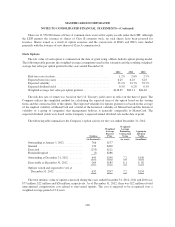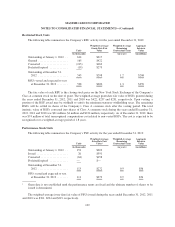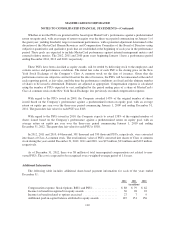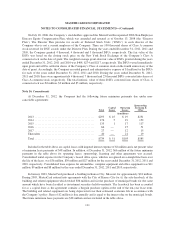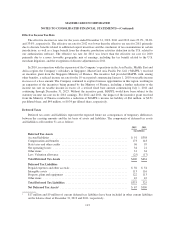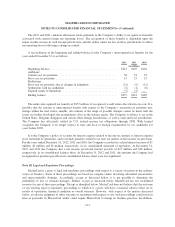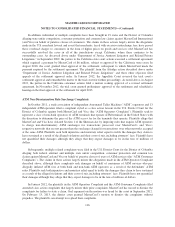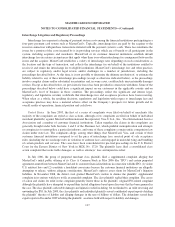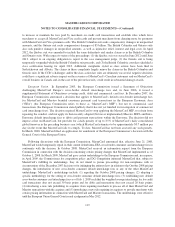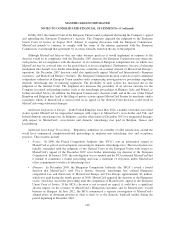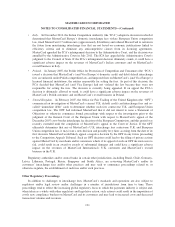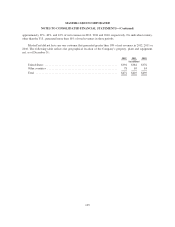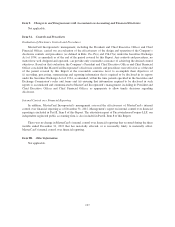MasterCard 2012 Annual Report Download - page 121
Download and view the complete annual report
Please find page 121 of the 2012 MasterCard annual report below. You can navigate through the pages in the report by either clicking on the pages listed below, or by using the keyword search tool below to find specific information within the annual report.MASTERCARD INCORPORATED
NOTES TO CONSOLIDATED FINANCIAL STATEMENTS—(Continued)
Interchange Litigation and Regulatory Proceedings
Interchange fees represent a sharing of payment system costs among the financial institutions participating in a
four-party payment card system such as MasterCard’s. Typically, interchange fees are paid by the acquirer to the
issuer in connection with purchase transactions initiated with the payment system’s cards. These fees reimburse the
issuer for a portion of the costs incurred by it in providing services which are of benefit to all participants in the
system, including acquirers and merchants. MasterCard or its customer financial institutions establish default
interchange fees in certain circumstances that apply when there is no other interchange fee arrangement between the
issuer and the acquirer. MasterCard establishes a variety of interchange rates depending on such considerations as
the location and the type of transaction, and collects the interchange fee on behalf of the institutions entitled to
receive it and remits the interchange fee to eligible institutions. MasterCard’s interchange fees and other practices
are subject to regulatory and/or legal review and/or challenges in a number of jurisdictions, including the
proceedings described below. At this time, it is not possible to determine the ultimate resolution of, or estimate the
liability related to, any of these interchange proceedings (except as otherwise indicated below), as the proceedings
involve complex claims and/or substantial uncertainties and, in some cases, could include unascertainable damages
or fines. Except as described below, no provision for losses has been provided in connection with them. Some of the
proceedings described below could have a significant impact on our customers in the applicable country and on
MasterCard’s level of business in those countries. The proceedings reflect the significant and intense legal,
regulatory and legislative scrutiny worldwide that interchange fees and acceptance practices have been receiving.
When taken as a whole, the resulting decisions, regulations and legislation with respect to interchange fees and
acceptance practices may have a material adverse effect on the Company’s prospects for future growth and its
overall results of operations, financial position and cash flows.
United States. In June 2005, the first of a series of complaints were filed on behalf of merchants (the
majority of the complaints are styled as class actions, although a few complaints are filed on behalf of individual
merchant plaintiffs) against MasterCard International Incorporated, Visa U.S.A., Inc., Visa International Service
Association and a number of customer financial institutions. Taken together, the claims in the complaints are
generally brought under both Sections 1 and 2 of the Sherman Act, which prohibit monopolization and attempts
or conspiracies to monopolize a particular industry, and some of these complaints contain unfair competition law
claims under state law. The complaints allege, among other things, that MasterCard, Visa, and certain of their
customer financial institutions conspired to set the price of interchange fees, enacted point of sale acceptance
rules (including the no surcharge rule) in violation of antitrust laws and engaged in unlawful tying and bundling
of certain products and services. The cases have been consolidated for pre-trial proceedings in the U.S. District
Court for the Eastern District of New York in MDL No. 1720. The plaintiffs have filed a consolidated class
action complaint that seeks treble damages, as well as attorneys’ fees and injunctive relief.
In July 2006, the group of purported merchant class plaintiffs filed a supplemental complaint alleging that
MasterCard’s initial public offering of its Class A Common Stock in May 2006 (the “IPO”) and certain purported
agreements entered into between MasterCard and its customer financial institutions in connection with the IPO: (1) violate
U.S. antitrust laws and (2) constitute a fraudulent conveyance because the customer financial institutions are allegedly
attempting to release, without adequate consideration, MasterCard’s right to assess them for MasterCard’s litigation
liabilities. In November 2008, the district court granted MasterCard’s motion to dismiss the plaintiffs’ supplemental
complaint in its entirety with leave to file an amended complaint. The class plaintiffs replied their complaint. The causes
of action and claims for relief in the complaint generally mirror those in the plaintiffs’ original IPO-related complaint
although the plaintiffs have attempted to expand their factual allegations based upon discovery that has been garnered in
the case. The class plaintiffs seek treble damages and injunctive relief including, but not limited to, an order reversing and
unwinding the IPO. In July 2009, the class plaintiffs and individual plaintiffs served confidential expert reports detailing
the plaintiffs’ theories of liability and alleging damages in the tens of billions of dollars. The defendants served their
expert reports in December 2009 rebutting the plaintiffs’ assertions both with respect to liability and damages.
117



